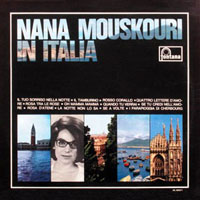
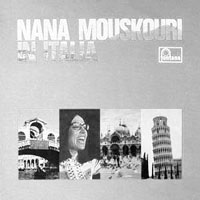
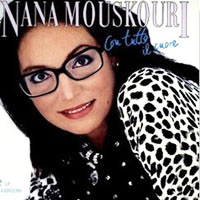
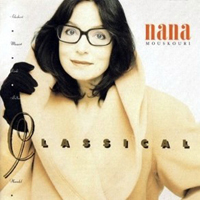
Italian Repertoire




During her career, Nana has recorded the equivalent of four albums in Italian. "In Italia", the only one which was released, dates back to 1965. It includes her first five singles as well as two unreleased titles. It came out not only in Italy but also in Canada and in Australia. In the 1990s, three records companies reissued it on CD. Various lyric writers adapted her hits of which: Alberto Salerno, Giorgo Calabrese, Giulio Rapetti Mogol and Leo Chiosso. Nana also borrowed several songs to the classical Repertoire. The most commun are found in her album of 1988 which came out in about twenty countries.
ROSA D'ATENE Once the song was a mega success in Germany, it was adapted in the main European languages. The Italian version was first recorded by Nelly Fioramonti, a popular singer of the sixties. The one of Nana shortly followed. "Rosa d'Atene", her fetish flower and a symbol of her origins, will remain a song to which she's recognized in Italy. In 1987, for purposes of the compilation "Con tutto il cuore", she re-recorded it with new arrangements and another orchestra. |
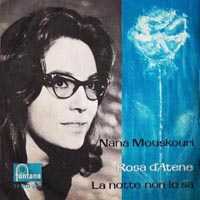 |
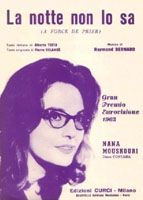 |
LA NOTTE NON LO SA The recording of her first single in Italian coincided with her participation at the Eurovision 1963. Nana decided to adapt "À force de prier", the title that she sang on that occasion. While millions of TV viewers discovered her throughout Europe, in Italy, her excellent diction was noticed while listening "La notte non lo sa". The singer and actress Graziella Caly also covered it. |
QUANDO TU VERRAI In 1960, for the second consecutive year, Nana won the Greek Song Festival, that time with two compositions of Manos Hadjidakis. The most famous, "To kyparissaki", was re-recorded a few years later for her collection "My favorite Greek songs" with the orchestra of Jacques Denjean. His new arrangements made of it a swinging cha-cha-cha that enchanted the music lovers. In Italy, it became "Quando tu verrai". |
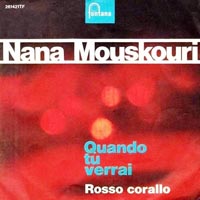 |
ROSSO CORALLO
"Rosso corallo", Nana's fith hit in Germany, was set on the side 1 of the second Italian single. During her TV appearance at "Teatro 10", in 1964, it was used as a musical intro to welcome her on the stage.
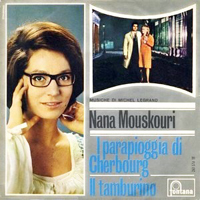 |
I PARAPIOGGIA DI CHERBOURG After the success of the famous film "The umbrellas of Cherbourg", the theme became an essential. Nana recorded two versions in Italian, of which is a shortened one. The singers Fausto Cigliano and Nicola D'Alessio recorded it with other lyrics. IL TAMBURINO In Italy also, "The little drummer boy" is covered by a multitude of singers and choirs in the national language. The lyrics differ depending on the versions. Nana considers these two songs like her first successes in France. |
IL TUO SORRISO NELLA NOTTE In October 1965, was released "Il tuo sorriso nella notte", a popular sirtaki, from the film "Zorba the Greek". Once more, Nana used her voice for the benefit of a song of her country, "Strosse to stroma sou". Thanks to bouzouki, her version remains the most authentic of all those re-recorded.
|
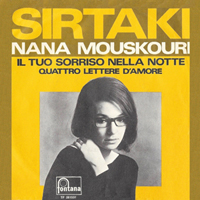 |
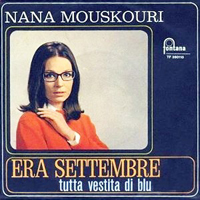 |
ERA SETTEMBRE Two years later, Nana returned to Italy to participate in three TV shows. She presented "Era settembre" which will be her last hit on record. Since then, wherever she is, she sings the original version, "Try to remember". |
CASTA DIVA "Casta diva", from the opera "Norma" by Vincenzo Bellini, is the Italian title that Nana sang most often. In 1975, the composer Alain Goraguer and the lyric writer Claude Lemesle adapted for her that aria which became "Toi qui t'en vas". Four years later, during her BBC TV special, she dared singing it in a more classical way and in the original language. The result was such that Nana decided to do the same in her concerts by evoking her years of studies at the Conservatory of Athens. In 1988, for the album "Classical", she recorded a lyrical version. |
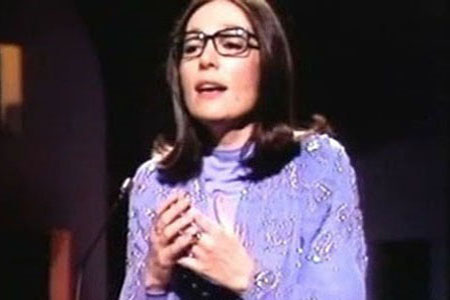 |
In the 60s, Nana went several times to Italy. But probably because of her international career, she had to focus on certain markets. In her long list of concerts, no one has been filed in that country. However, on stage, she sang some titles in Italian. "Casta diva" from 1979 to 1986 inclusively. "Una furtiva lagrima" and "Voi che sapete", between 1988 and 1992. "Con te partirò" from 1997 to 1999. And in 2007, "O sole mio" which was released on her DVD "At the Albert Hall".